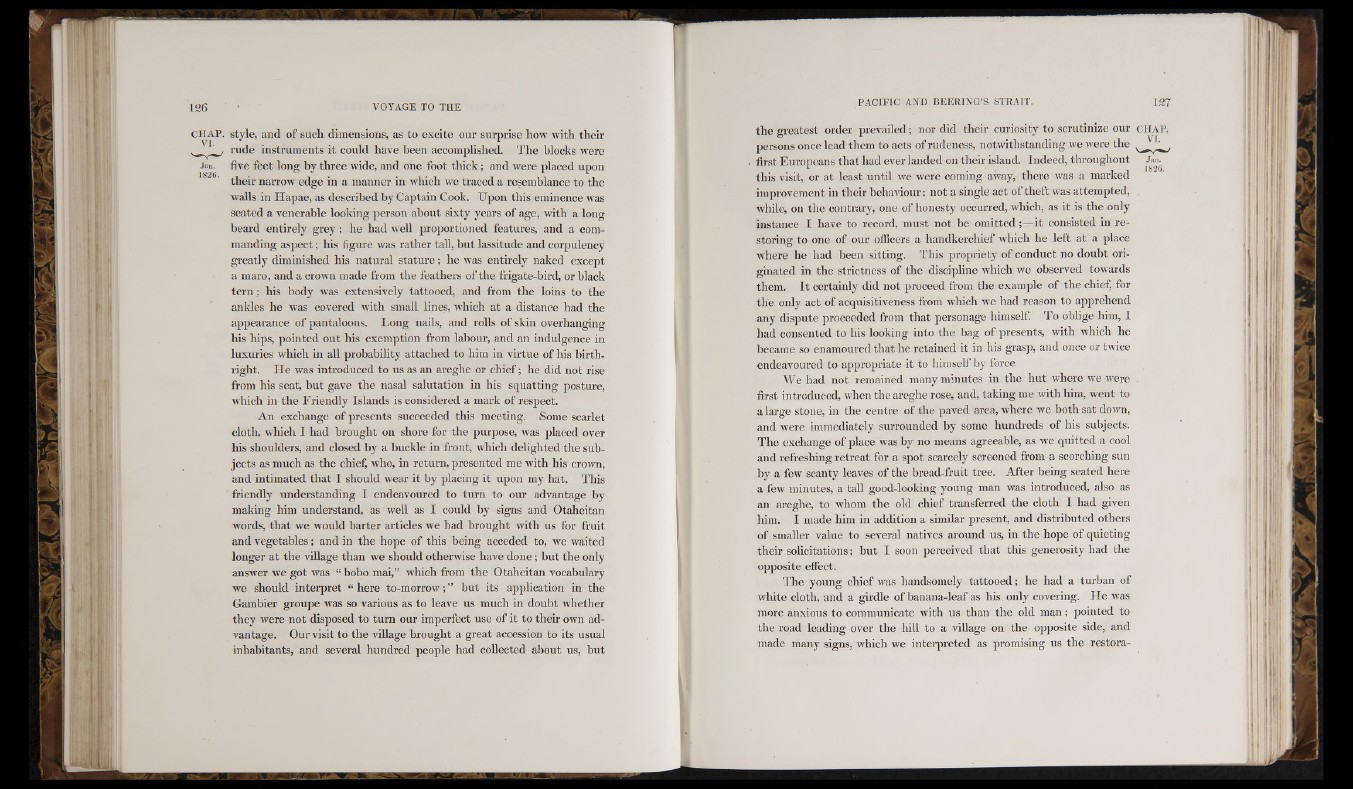
C H A P . Style, an d o f such dimensions, as to excite our surprise how with th e ir
rude instruments it could have been accomplished. The blocks were
five feet long by three wide, and one foot thick ; and were placed upon
their narrow edge in a manner in which we traced a resemblance to the
walls in Hapae, as described by Captain Cook. Upon this eminence was
seated a venerable looking person about sixty years of age, with a long
beard entirely grey ; he had well proportioned features, and a commanding
aspect; his figure was rather tall, but lassitude and corpulency
greatly diminished his natural stature; he was entirely naked except
a maro, and a crown made from the feathers of the frigate-bird, or black
tern ; his body was extensively tattooed, and from the loins to the
ankles he was covered with small lines, which at a distance had the
appearance of pantaloons. Long nails, and rolls of skin overhanging
his hips, pointed out his exemption from labour, and an indulgence in
luxuries which in all probability attached to him in virtue of his birthright.
He was introduced to us as an areghe or chief; he did not rise
from his seat, but gave the nasal salutation in his squatting posture,
which in the Friendly Islands is considered a mark of respect.
An exchange of presents succeeded this meeting. Some scarlet
cloth, which I had brought on shore for the purpose, was placed over
his shoulders, and closed by a buckle in front, which delighted the subjects
as much as the chief, who, in return, presented me with his crown,
and intimated that I should wear it by placing it upon my hat. This
friendly understanding I endeavoured to turn to our advantage by
making him understand, as well as I could by signs and Otaheitan
words, that we would barter articles we had brought with us for fruit
and vegetables; and in the hope of this being acceded to, we waited
longer at the village than we should otherwise have done; but the only
answer we got was “ bobo mai,” which from the Otaheitan vocabulary
we should interpret “ here to-morrow; ” but its application in the
Gambier groupe was so various as to leave us much in doubt whether
they were not disposed to turn our imperfect use of it to their own advantage.
Our visit to the village brought a great accession to its usual
inhabitants, and several hundred people had collected about us, but
the greatest order prevailed; nor did their curiosity to scrutinize our CHAP,
persons once lead them to acts of rudeness, notwithstanding we were the ^
first Europeans that had ever landed on their island. Indeed, throughout
Jan-
1826.
this visit, or at least until we were coming away, there was a marked
improvement in their behaviour; not a single act of theft was attempted,
while, on the contrary, one of honesty occurred, w'hich, as it is the only
instance I have to record, must not be omitted it consisted in restoring
to one of our officers a handkerchief which he left at a place
where he had been sitting. This propriety of conduct no doubt originated
in the strictness of the discipline which we observed tow'ards
them. It certainly did not proceed from the example of the chief, for
the only act of acquisitiveness from which w'e had reason to apprehend
any dispute proceeded from that personage himself. To oblige him, 1
had consented to his looking into the bag of presents, with which he
became so enamoured that he retained it in his grasp, and once or tw'ice
endeavoured to appropriate it to liiraself by force
W e had not remained many minutes in the hut w'here we were
first introduced, w'hen the areghe rose, and, taking me with him, went to
a large stone, in the centre of the paved area, where we both sat down,
and were immediately surrounded by some hundreds of his subjects.
The exchange of place w'as by no means agreeable, as we quitted a cool
and refreshing retreat for a spot scarcely screened from a scorching sun
by a few scanty leaves of the bread-fruit tree. After being seated here
a few minutes, a tall good-looking young man was introduced, also as
an areghe, to whom the old chief transferred the cloth I had given
him. I made him in addition a similar present, and distributed others
of smaller value to several natives around us, in the hope of quieting
their solicitations; but I soon perceived that this generosity had the
opposite effect.
The young chief was handsomely tattooed; he had a turban of
white cloth, and a girdle of banana-leaf as his only covering. He w'as
more anxious to communicate with us than the old man ; pointed to
the road leading over the hill to a village on the opposite side, and
made many signs, which we interpreted as promising us the restoraf
.